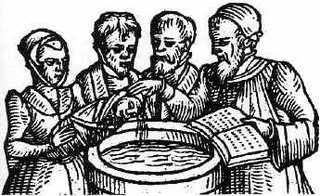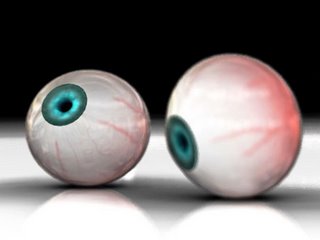 Church history is anything but pretty. Schisms and rifts mar the terrain. I once recall reading about a heated controversy that erupted between two groups during the Middle Ages regarding baptism. One group believed in baptism by immersion, the other, baptism by sprinkling. The debate finally ended when a member of the immersion group drowned a member of the sprinkling group.
Church history is anything but pretty. Schisms and rifts mar the terrain. I once recall reading about a heated controversy that erupted between two groups during the Middle Ages regarding baptism. One group believed in baptism by immersion, the other, baptism by sprinkling. The debate finally ended when a member of the immersion group drowned a member of the sprinkling group.
Yep, when it comes to protecting doctrinal turf, God’s people can get mighty feisty.
And well we should. After all, Christ spoke the Truth, died for the Truth and asks us to defend the Truth. But exactly what truths are worth drowning someone over? The young zealot would do well to imbed Augustine’s quote in their mental toolbar:
In essentials unity, in non-essentials liberty, in all things charity.
My Aunt Mary, even though she prayed to the saints and misted her houseplants with holy water, had charity. And this, more than anything, kept me scratching my head.
Maybe some of the things I was fighting for, weren’t essentials. And maybe the essentials I was defending, demanded less heat and more love.
It was Charles Spurgeon,  the great British Baptist, who added balance to my otherwise tilting doctrinal tower. Spurgeon was a staunch Calvinist, but he clearly had two eyes and a sense of humor.
the great British Baptist, who added balance to my otherwise tilting doctrinal tower. Spurgeon was a staunch Calvinist, but he clearly had two eyes and a sense of humor.
Calvinism and Arminianism are commonly pitted against each other, a doctrinal skirmish that continues to this day. I’d become embroiled in the debate during my ministry, with two factions demanding my allegiance. It wasn’t until I read a sermon by Spurgeon, that the planets aligned.
Most Calvinists would say salvation is entirely an act of God; most Arminians would say, men are free to accept or reject God’s gift. There are many nuances and variations within these camps. You can line up scriptures on both sides of the aisle. Charles Spurgeon addressed the apparent tension between these two positions in a sermon entitled, Faith and Regeneration. His words have helped me immensely.
I earnestly long that these two doctrines may be well balanced in your souls… Brethren be willing to see both sides of the shield of truth. Rise above the babyhood which cannot believe two doctrines until it sees the connecting link. Have you not two eyes, man? Must you needs put one of them out in order to see clearly? Is it impossible to you to use a spiritual stereoscope, and look at two views of truth until they melt into one, and that one becomes more real and actual because it is made up of two? Many men refuse to see more than one side of a doctrine, and persistently fight against anything which is not on its very surface consistent with their own idea. In the present case I do not find it difficult to believe faith to be at the same time the duty of man and the gift of God; and if others cannot accept the two truths, I am not responsible for their rejection of them; my duty is performed when I have honestly borne witness to them.
This metaphor — seeing “both sides of the shield of truth” and having a “spiritual stereoscope” — opened my eyes. Both of them.
Could it be that Calvinists and Arminans both had something to offer, that “these two doctrines may be well balanced”? Could it be that Catholics and Protestants were just different specks along a vast spectrum? Maybe Truth was bigger than any one system could contain. Perhaps God couldn’t be boxed in by terminology, definition or tradition. And maybe all my eye-plucking was doing more harm than good.
 So I began looking for the middle ground, the place where you’re accused of being a spineless ecumenist, where more “convinced” bretheren flog you and and the unconvinced still think you’re narrow-minded; where you’re too Arminian for the Calvinist, and too Calvinist for the Arminian; where one minute you’re doing the Jericho March and the next you’re kneeling at a statue of Saint Francis.
So I began looking for the middle ground, the place where you’re accused of being a spineless ecumenist, where more “convinced” bretheren flog you and and the unconvinced still think you’re narrow-minded; where you’re too Arminian for the Calvinist, and too Calvinist for the Arminian; where one minute you’re doing the Jericho March and the next you’re kneeling at a statue of Saint Francis.
Yeah, I’ve got a long way to go. But I’ve stopped plucking eyes and drowning people. I figger it’s better to err on the side of charity. So that’s why I have The Ooze and The New Pantegruel next to each other. I’ve found I can see better with both of them.















Well then! Er…….thank you for helping me see more clearly!
🙂 Diane
I sometimes find these academic “discussions” people have back and forth intriguing. They have their place, and theology and theologins will always abound. I’m just not one of them. I admire those intellectuals who can keep all the names and what falls under their names straight, but I don’t loose a wink of sleep over the fact that I cannot 😉
I usually walk away with, “I’m not sure what all of you just said. I’m sure you have a point somewhere. But what I can tell you is what God has done for and through me. What I can tell you is of my personal experience and my personal intimacy with my Almighty God.”
Often I hear things that just don’t line up in my head – I cannot tell you why, I just know they don’t. Then someday I hear someone academically explain it . . . and it makes sense; yet I can never regurgitate it. It’s just not how God wired me.
Yet there are things I can do and understand and comprehend and process without thinking that many others cannot!
There was a time I stressed over these things . . . but, I guess like you, wisdom and maturity have grown and the real stresses in life have become, well, real.
You’re turning into my doppelganger, sweetie. 🙂 For a couple decades now, I’ve thought of myself as a free will meets election mixer. I don’t think either extreme is fully right. I have concluded as you, God cannot be boxed. Somehow He chooses while we also choose. I don’t see God as playing word games with us. If he says “Come,” or “Reason,” or “Drink,” or “Choose,” then I have to believe that while He calls and chooses, I am also free to come or go, reason or not reason, drink or not, choose for or against.
I have no idea whatsoever how that works. But my box ain’t big enough for the God who’s toe is too bix for any box.
Mir
http://mirathon.blogspot.com
Mir, I’ve heard it said that the sign over the doorway to heaven reads, “Whoesoever will.” But from the inside the sign reads, “Chosen before the foundation of the world.”